The 2020 Mac Mini Unleashed: Putting Apple Silicon M1 To The Test
by Andrei Frumusanu on November 17, 2020 9:00 AM ESTBenchmarks: Whatever Is Available
As we’ve had very little time with the Mac mini, and the fact that this not only is a macOS system, but a new Arm64-based macOS system, our usual benchmark choices that we tend to use aren’t really available to us. We’ve made due with a assortment of available tests at the time of the launch to give us a rough idea of the performance:
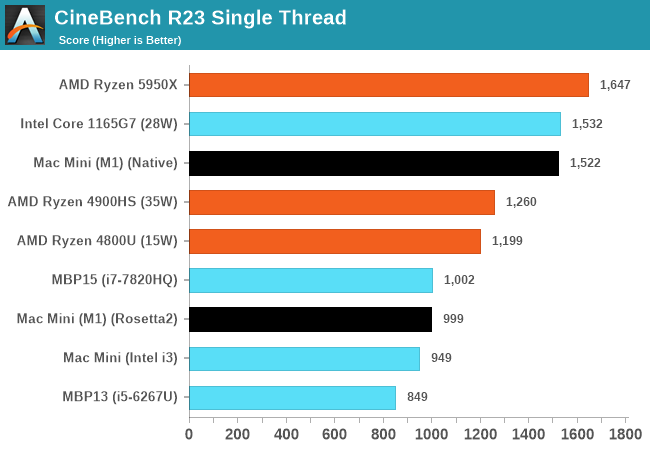
One particular benchmark that sees the first light of day on macOS as well as Apple Silicon is Cinebench. In this first-time view of the popular Cinema4D based benchmark, we see the Apple M1 toe-to-toe with the best-performing x86 CPUs on the market, vastly outperforming past Apple iterations of Intel silicon. The M1 here loses out to Zen3 and Tiger Lake CPUs, which still seem to have an advantage, although we’re not sure of the microarchitectural characteristics of the new benchmark.
What’s notable is the performance of the Rosetta2 run of the benchmark when in x86 mode, which is not only able to keep up with past Mac iterations but still also beat them.
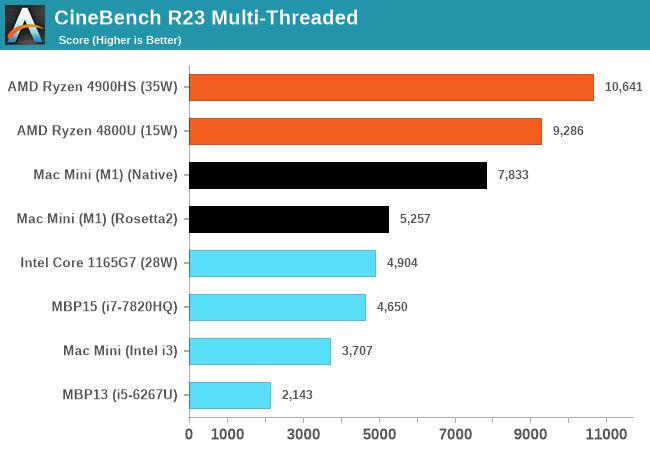
In the multi-threaded R23 runs, the M1 absolutely dominates past Macs with similar low-power CPUs. Just as of note, we’re trying to gather more data on other systems as we have access to them, and expand the graph in further updates of the article past publishing.
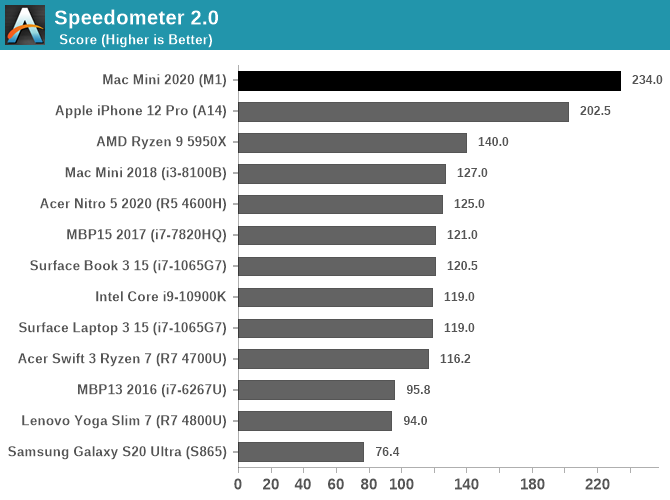
In browser-benchmarks we’ve known Apple’s CPUs to very much dominate across the landscape, but there were doubts as to whether this was due to the CPUs themselves in the iPhone or rather just the browsers and browser engines. Now running on macOS and desktop Safari, being able to compare data to other Intel Mac systems, we can come to the conclusion that the performance advantage is due to Apple’s CPU designs.
Web-browsing performance seems to be an extremely high priority for Apple’s CPU, and this makes sense as it’s the killer workload for mobile SoCs and the workload that one uses the most in everyday life.
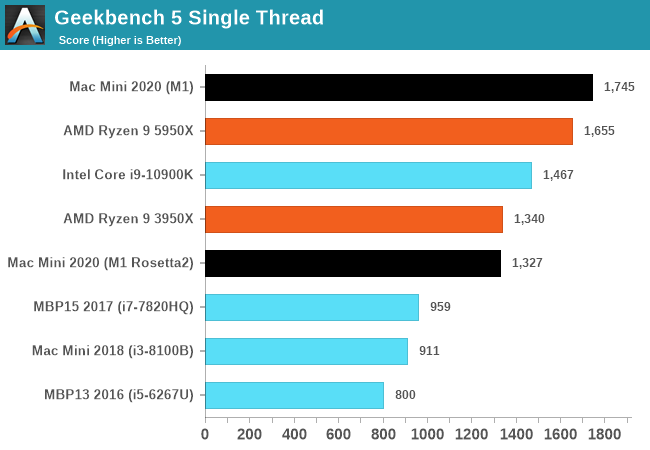
In Geekbench 5, the M1 does again extremely well as it actually takes the lead in our performance figures. Even when running in x86 compatibility mode, the M1 is able to match the top single-threaded performance of last generation’s high-end CPUs, and vastly exceed that of past iterations of the Mac mini and past Macbooks.
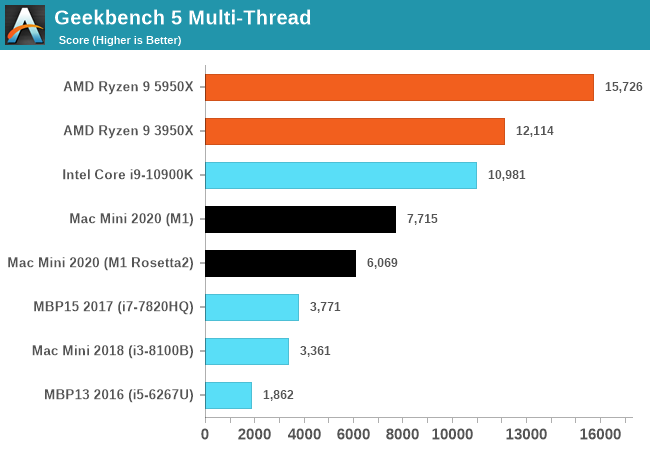
Multi-threaded performance is a matter of core-count and power efficiency of a design. The M1 here demolishes a 2017 15-inch Macbook Pro with an Intel i7-7820HQ with 4 cores and 8 threads, posting over double the score. We’ll be adding more data-points as we collect them.


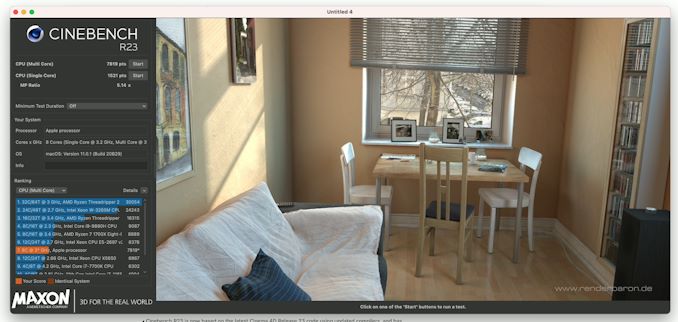








682 Comments
View All Comments
Ppietra - Tuesday, November 24, 2020 - link
Sorry, but no! What you showed for the 4800U isn’t the power draw of the computer, it’s the power draw of a processor doing a completely different test in an unnamed computer in unknown settings. Not to mention that this M1 analysis is with a desktop computer not a laptop. Why are you trying to deceive?If you want to see computer power consumption go to Tally Ho Tech youtube channel, you will see how a laptop with the 4800U consumes around 3 times more in Cinebench than a laptop with a M1 chip.
BushLin - Tuesday, November 24, 2020 - link
Oh... I have to wade through some random YouTube channel to see some other flawed comparison? If you can link to an objective test showing actual power draw, post the link.Ppietra - Tuesday, November 24, 2020 - link
hmmm! So you complain about a channel doing a straightforward comparison in similar conditions, but you have no problems in using different kinds of power consumption from completely different tests to validate your "theory". Grand!!For the record thunng8 links shows you the power consumption of the M1 in a Cinebench test done by Anandtech’ author.
BushLin - Tuesday, November 24, 2020 - link
No, I'm continuing to complain that you don't post a link to your evidence, I'm not sitting through every YouTube video of some random when in the next breath you refer again to a forum post linked by thunng8 which is for a different, 4700U CPU.No amount of FUD changes the fact that the M1 is great at single thread, especially for the power but isn't the Jesus CPU you dream it to be in multithreaded workloads.
Put up or shut up.
Ppietra - Tuesday, November 24, 2020 - link
I have said nothing about a 4700U CPU nor referred to links to talk about AMD CPUs. I very clearly only mentioned M1 data when referring to thunng8 links. Neither have I said that the M1 had the highest performance of all, I only talked about power consumption.https://www.youtube.com/watch?v=wuvZQOUDCKY
BushLin - Tuesday, November 24, 2020 - link
Great YouTube video, didn't measure the power draw. Yet you're the one throwing around words like deceive.Ppietra - Tuesday, November 24, 2020 - link
Didn’t measure the power draw? Really?So showing battery level change after 10 minute Cinebench test, with known battery capacities, isn’t sufficient data to determine approximate power draw? Not even enough to give you an idea? A little bit of basic math, then!
16% drop in a 60.7Wh battery gives 9.7Wh of energy use for the AMD laptop. If you prefer in watts, since it was a 10 minute run that gives 58W.
6% drop in a 58Wh battery gives 3.5Wh of energy used for the MacBook Pro. In a 10 minute run that gives 21W, to do the same task.
From a previous video the Cinebench MT scores were 9976 for AMD and 7800 for the MacBook.
If you normalize energy consumption to the Cinebench score, that would mean the MacBook Pro consumes less than half for the same performance!
BushLin - Tuesday, November 24, 2020 - link
What are the cinebench results when running on battery? What is the battery's actual capacity and how fast does it drain when fully loaded? How does the system report battery percentage vs voltage of the cells? How much power does the screen consume? Can you trust the person making the video to be thorough and objective?Could go on and on, or just stick a $15 meter on the AC plug and actually measure it.
Ppietra - Tuesday, November 24, 2020 - link
?? I gave you the Cinebench results. I gave the actual battery capacity, I gave how much it drained when running Cinebench and in what time interval - it is all in the videos!How much power does the screen consume??? REALLY!!!? For someone who argued for the use of "power measurement" "at the wall rather than just the SoC " to now come and argue against measuring the battery power drain in a 10 minutes test it is laughable. Even more so when in the end you make another U turn and just argue about measuring power at the plug - so the screen doesn’t matter now!??
Just face reality M1 power consumption has been measured at 15W in Cinebench, by Anandtech. 4800U power consumption can go higher than 25W since it can be boosted to 35W.
BushLin - Tuesday, November 24, 2020 - link
Since you're either a troll or insane, I'm not going to expend any further effort beyond answering this:"Just face reality M1 power consumption has been measured at 15W in Cinebench, by Anandtech"
With this:
https://images.anandtech.com/graphs/graph16252/119...